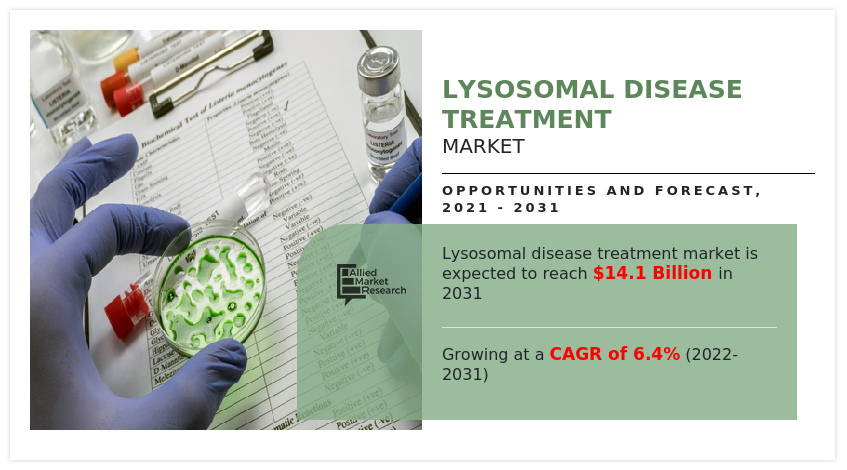
Lysosomal Disease Treatment Market 2023 Trends : Predicted to Grow at a CAGR of 6.4% by 2031, Repot
Lysosomal disease (LD) arises from a genetic metabolic disorder characterized by insufficient synthesis of lysosomal enzymes. With more than 50 distinct forms of lysosomal storage disorders present in the human body, treatment options are currently limited. However, the ongoing surge in research and development (R&D) activities aimed at formulating effective treatments is projected to drive the expansion of the lysosomal disease treatment market share.

Anticipated increases in government initiatives and investments for the development of groundbreaking medications are set to amplify market growth throughout the forecast period. Additionally, the expected rise in the prevalence of lysosomal disease treatment will further stimulate market expansion, while the introduction of orphan drugs is poised to provide additional impetus to this growth.
The lysosomal disease treatment market was valued at $7.6 billion in 2021, and is estimated to reach $14.1 billion by 2031, growing at a CAGR of 6.4% from 2022 to 2031.
Request Sample Copy of Report- https://www.alliedmarketresearch.com/request-sample/5655
Lysosomal Disease Treatment Market Drivers
Increasing awareness of preventive measures for lysosomal diseases, coupled with the evolving trends within the lysosomal disease treatment market, is forecasted to drive the expansion of the market size. The growth of the pharmaceutical and healthcare sectors is also expected to contribute significantly to the development of the lysosomal disease treatment market. Nonetheless, the market’s growth is hindered by the scarcity of effective treatments and their associated high costs.
Investment Opportunities in the Lysosomal Disease Treatment Market:
- Collaborative Research Initiatives: Encouraging collaborative efforts among research institutions, pharmaceutical companies, and regulatory bodies can accelerate the development of innovative treatments for lysosomal diseases and facilitate faster market entry.
- Technological Innovations: Investing in cutting-edge technologies such as gene editing, cell therapy, and precision medicine holds the potential to revolutionize lysosomal disease treatment approaches, fostering the development of more targeted and effective therapies.
- Patient Advocacy and Support: Investing in patient-centric initiatives, including support groups, educational programs, and advocacy efforts, not only enhances disease awareness but also promotes patient engagement and facilitates the development of patient-focused treatment strategies.
- Global Market Expansion: Exploring opportunities for market expansion in emerging economies with a rising focus on healthcare infrastructure development can help broaden patient access to lysosomal disease treatments and create new revenue streams for pharmaceutical companies.
- Diversification of Therapeutic Modalities: Investing in the exploration and development of diverse therapeutic modalities, including small molecules, gene therapies, and enzyme replacement therapies, can diversify product portfolios and address the unmet medical needs of diverse lysosomal disease subtypes.
Do Purchase Enquiry- https://www.alliedmarketresearch.com/purchase-enquiry/5655
Key findings of the study
- By disease type, the Gaucher’s diseases segment dominated the market in 2021, and it is expected to remain dominant throughout the forecast period.
- On the basis of type of therapy, the enzyme replacement therapy segment dominated the market in 2021.
- By end user, the hospitals segment dominated the market in 2021.
- Region wise, North America dominated the market in 2021.
Lysosomal Disease Treatment Market Segmentation-
| By Disease Type |
|
| By Type of Therapy |
|
| By End User |
|
Procure Complete Report – https://www.alliedmarketresearch.com/lysosomal-disease-treatment-market/purchase-options
By disease type, the Gaucher’s disease segment dominated the market in 2021, and is expected to remain dominant during the forecast period, owing to increase in incidences of lysosomal diseases and rise in awareness related to early diagnosis of lysosomal diseases.
Depending on type of therapy, the enzyme replacement therapy segment dominated the market in 2021, and is expected to remain dominant during the forecast period, owing to increasing research and development (R&D) activities to develop an efficient treatment.
Key Lysosomal Disease Treatment Players
- Novartis AG
- Pfizer Inc.
- Amicus Therapeutics, Inc.
- Sigilon Therapeutics, Inc.
- Takeda Pharmaceutical Company Limited
- BioMarin Pharmaceutical Inc.
- Johnson & Johnson
- Sanofi
- Eli Lilly and Company
- Alexion Pharmaceuticals, Inc.
Browse More Trending Reports in Healthcare Industry By AMR
Bowel Management Systems market https://www.alliedmarketresearch.com/bowel-management-systems-market-A06093
Surgical Retractor Market https://www.alliedmarketresearch.com/surgical-retractor-market-A06077
Plasma Protein Therapeutics Market https://www.alliedmarketresearch.com/plasma-protein-therapeutics-market-A12692
Editor Details
-
Company:
- The Wire Times
